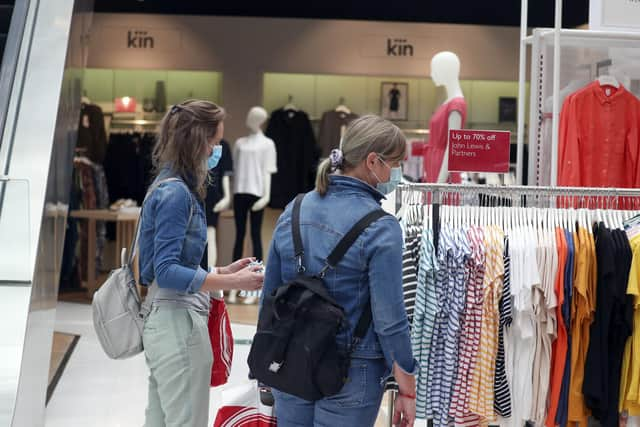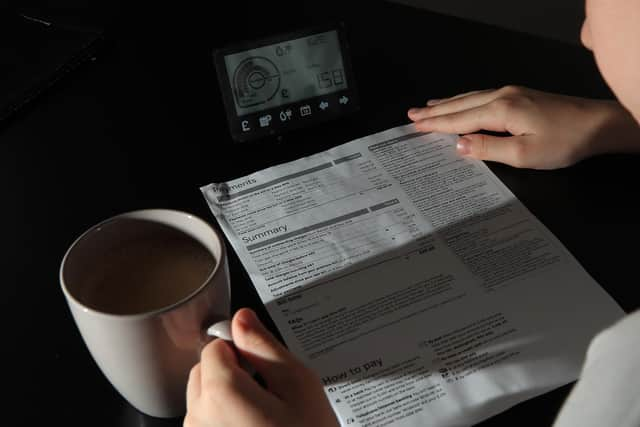Over two million in Yorkshire 'won't be able to afford acceptable standard of living' from April
The findings from the New Economics Foundation thinktank come after Levelling Up Secretary Michael Gove insisted yesterday that the Government would press ahead with its controversial increase in National Insurance rates next month despite growing concerns about the rapidly rising prices of food, energy and petrol.
The New Economics Foundation thinktank said its research has found 41 per cent of households in Yorkshire and Humber - representing 2.3 million people - will be under the Minimum Income Standard from April, compared to 34 per cent - or 23 million people - in this position nationally.
Advertisement
Hide AdAdvertisement
Hide AdIt also represents a substantial increase on the 2019 figure for the region, when 30 per cent of households were classified as being in this position.


Yorkshire is expected to be the second-worst hit region nationally, behind only the North East.
The Minimum Income Standard is a measure calculated by Loughborough University’s Centre for Research in Social Policy based on what the public thinks is needed for an “acceptable standard of living”.
The research suggests those affected in Yorkshire and Humber will have an average household income that is £8,600 below what is needed for a good standard of living. It said the amount needed to reach the standard after housing costs for a family with two children is £507 per week this year - £35 more than in 2021.
Advertisement
Hide AdAdvertisement
Hide AdSam Tims, Economist at the New Economics Foundation, said: “The cost of living is increasing faster than at any point in recent history. While all families are set to feel a squeeze come April, the lowest income households will be hit proportionately harder. But the cost of living is only a crisis when people cannot afford it and government support must be able to flexibly respond to this. There is little time left for the Chancellor to take action to avert the worst real-terms incomes squeeze in 50 years.”


The foundation has suggested the creation of a new social security system, or ‘Living Income’, to set an ‘income floor’ based on the MIS, which no one can fall below whether they are in or out of work.
The thinktank is also calling for everyone in the UK to be enrolled onto the Universal Credit system so new payments begin as soon as people become eligible. It said the move would allow the 1.3m people currently missing out on payments average £7,300 to receive support they are entitled to. It has also proposed the Government uprates all means-tested benefits by the latest level of inflation to keep pace with price rises.
Speaking on the BBC’s Sunday Morning programme yesterday, Mr Gove said the Government was “very aware” that the Russian invasion of Ukraine was adding to existing cost of living pressures.
Advertisement
Hide AdAdvertisement
Hide AdBut he said rather than cutting taxes more widely in this month’s Spring Statement, the Government would instead focus on targeted support where it was felt it could have the most effect. “We have cut taxes by cutting council tax for people who are on the lower bands. We are doing that deliberately to target support at those who are on lower incomes at a time when we know they face considerable pressures.”
He went on to rule out any cancellation or postponement of next month’s National Insurance increase.
The 1.25 percentage point increase to National Insurance is due to take effect from April 6 and is expected to raise £12 billion a year for health and social care services, but it breaks Prime Minister Boris Johnson’s 2019 election manifesto commitment not to raise taxes.
Mr Gove said: “We need that National Insurance increase in order to ensure we can fund the NHS and social care to deal with the Covid backlog.”
Millions of children to be affected
Advertisement
Hide AdAdvertisement
Hide AdNearly half of all children will be living below a socially acceptable standard of living, the research has suggested.
It found 48 per cent of children in the country - seven million in total - will be living in households where income does not reach the Minimum Income Standard.
That is up from 40 per cent in 2019.
Pensioners in couples are the least affected group in society.
But 17 per cent - equivalent to 1.8m people - will still fall below the standard, up from 12 per cent three years ago.
Advertisement
Hide AdAdvertisement
Hide AdA total of 31 per cent of single pensioners will be under the living standard, an increase from 27 per cent.
Support The Yorkshire Post and become a subscriber today. Your subscription will help us to continue to bring quality news to the people of Yorkshire. In return, you'll see fewer ads on site, get free access to our app and receive exclusive members-only offers. Click here to subscribe.